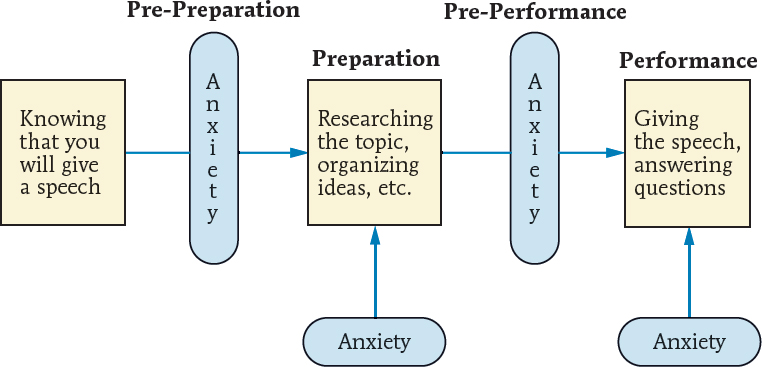Pinpoint the Onset of Public Speaking Anxiety
Different people become anxious at different times during the speechmaking process. Some people start to feel anxious as soon as they learn that they will have to give a speech. Others don’t really get nervous until they approach the podium. Even the kind of speech assigned (e.g., being called on to deliver off-the-cuff remarks versus reading from a prepared speech) may be a factor in when and how much a speaker feels anxious.4 By pinpointing the onset of speech anxiety, you can manage it promptly with specific anxiety-reducing techniques (see Figure 3.1).
RECOGNIZING AND OVERCOMING YOUR UNDERLYING FEARS ABOUT PUBLIC SPEAKING
| Problem | Solution |
 Are you intimidated by a lack of experience?
Are you intimidated by a lack of experience?
|
Prepare well and practice your speech several times in front of at least one other person. This actual experience delivering your speech will help build your confidence. |
 Are you worried about appearing different from others?
Are you worried about appearing different from others?
|
Remember that everyone is different from everyone else. Dress appropriately for the occasion and be well groomed to make a good impression. |
 Are you uncomfortable about being the center of attention?
Are you uncomfortable about being the center of attention?
|
Focus on the speech and not on yourself, and remember that the audience won’t notice anything about you that you don’t want to reveal. |
Pre-Preparation Anxiety
Some people feel anxious the minute they know they will be giving a speech. Pre-preparation anxiety can be a problem when the speaker delays planning for the speech, or when it so preoccupies the speaker that he or she misses vital information needed to fulfill the speech assignment. If you are particularly affected by anxiety at this stage, start immediately to use the stress-reducing techniques described later in this chapter.

Preparation Anxiety
For a few people, anxiety arises only when they actually begin to prepare for the speech. They might feel overwhelmed at the amount of time and planning required or hit a roadblock that puts them behind schedule. Preparation pressures produce a cycle of stress, procrastination, and outright avoidance, all of which contribute to preparation anxiety. Research has shown, however, that for most speakers, anxiety is lowest during the preparation phase,5 suggesting that the best way to gain a sense of control and confidence is to immerse yourself in the speech’s preparation.
Pre-Performance Anxiety
Some people experience anxiety as they rehearse their speech. This is when the reality of the situation sets in: They anticipate an audience that will be watching and listening only to them; or they feel that their ideas aren’t as focused or as interesting as they should be, and they sense that time is short. If this pre-performance anxiety is strong enough, they may even decide to stop rehearsing. If you experience heightened anxiety at this point, consider using anxiety stop-time: Allow your anxiety to present itself for up to a few minutes until you declare time for confidence to step in so you can proceed to complete your practice.6
I experience anxiety before, during, and after the speech. My “before speech” anxiety begins the night before my speech, but then I begin to look over my notecards, and I start to realize that I am ready for this speech. I practice one more time and I tell myself I am going to be fine.
— Paige Mease, student
Performance Anxiety
For most people, anxiety is highest just as a speech begins.7 Performance anxiety is probably most pronounced during the introduction portion of the speech when we are most aware of the audience’s attention. Not surprisingly, audiences we perceive to be hostile or negative usually cause us to feel more anxious than those we sense are positive or neutral.8 However, experienced speakers agree that by controlling their nervousness during the introduction, the rest of the speech goes quite smoothly.
Each of us will experience more or less speech anxiety at these four different points in the process depending mainly on our level of trait anxiety. People with high trait anxiety are naturally anxious much of the time, whereas people with low trait anxiety experience nervousness usually only in unusual situations. Public speaking situations tend to make people nervous regardless of their level of trait anxiety, for the reasons outlined earlier (lack of experience, feeling different, being the center of attention). But it can be more challenging for high trait-anxious individuals than low trait-anxious persons. For instance, researchers have shown that low trait-anxious people get nervous when starting a speech but gain confidence throughout the speech. Regardless of your level of trait anxiety, and when anxiety about a speech strikes, the important thing to remember is that you can manage the anxiety and control the time and effort you put into planning, rehearsing, and delivering a successful speech.